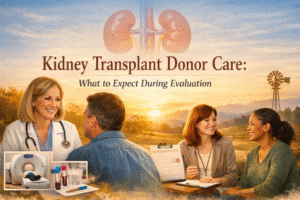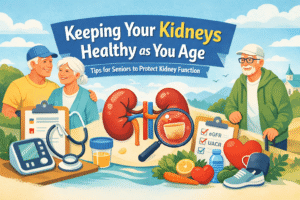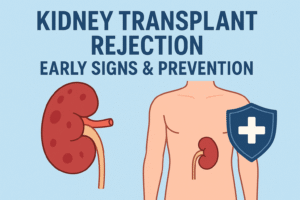The Power of Early Detection
Kidney damage often happens quietly. Without symptoms, you may not know until a significant decline. Routine kidney screenings catch problems early, giving you control. These simple tests—urine checks, blood tests, and blood pressure monitoring—reveal hidden issues. Detecting changes early opens doors to treatments and lifestyle adjustments that protect your kidneys. At South Oklahoma Kidney Center, we emphasize early screening as a vital step toward lasting health. Taking this small action today can prevent major complications tomorrow. You deserve clarity and peace of mind about your kidney health. No one should wait until it is too late to act.
Why Early Detection Saves Lives
Routine screenings reveal kidney issues before they cause serious harm. Early detection lets you and your care team act fast. Treating problems in the early stages often reverses damage or stops it from getting worse. That means you avoid complications like high blood pressure, fluid overload, and even kidney failure.
Here is why catching issues early matters:
- You gain more treatment options, often less invasive and more effective.
- You prevent emergency visits and hospital stays.
- You protect other organs, such as the heart, from secondary damage.
- You maintain better energy levels and overall well-being.
- You build a plan that fits your lifestyle before symptoms limit choices.
At South Oklahoma Kidney Center, we use cutting-edge testing to spot risks you cannot feel. Our goal is simple: help you stay healthy longer with clear, personalized guidance.
Who Should Get Routine Kidney Screenings—and When
Kidney disease often starts without warning. You should schedule routine kidney screenings if you meet any of these criteria:
- You have diabetes, since high blood sugar strains the kidney filters
- You manage high blood pressure, which harms tiny blood vessels.
- A family history of kidney disease or known genetic risk factors
- You take medications like NSAIDs that can affect kidney function.
- You are age sixty or older, because kidneys lose some efficiency over time.
- You belong to higher-risk groups, such as African American, Hispanic, or Native American communities.
Aim for screening at least once a year if you fit any of these profiles. If tests show changes, your care team may suggest more frequent checks. Early and regular testing keeps you ahead of problems and protects your long-term kidney health.
What a Kidney Screening Entails
A standard kidney screening uses simple, noninvasive tests to check function and detect early warning signs:
- Blood test measures creatinine and estimates glomerular filtration rate
- Urine test checks for protein or blood, which signal kidney stress
- Blood pressure reading since high pressure often accompanies kidney issues
- Ultrasound is used in some cases to assess kidney size and structure
- Medication review to identify drugs that may affect kidney health
Most screenings take less than thirty minutes. You walk in, complete a blood draw and urine sample, and then get your pressure taken. Results arrive quickly, and your care team at South Oklahoma Kidney Center explains what each number means. Knowing exactly where you stand helps you act before damage advances.
Taking Action After Your Screening
Screening without follow-up does little good. Once you know your results, take these steps:
- Discuss results with your nephrologist to understand risks and next steps.
- Adjust medications as needed under professional guidance.
- Adopt lifestyle changes like improved diet, exercise, and hydration.
- Schedule regular follow-ups based on your risk profile.
- Engage your support network—share results with family or caregivers
Following a clear plan turns information into prevention. At South Oklahoma Kidney Center, our Kidney Disease Care & Prevention services guide you from screening to sustained wellness.
Partner With Kidney Disease Care & Prevention ExpertsYour kidneys work nonstop to keep you well. Routine screenings give you the power to protect this vital system. Do not wait for symptoms to emerge. Schedule your routine kidney screenings today and take the first step toward lifelong kidney health and peace of mind.




